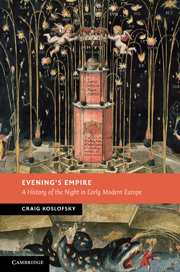Book contents
- Frontmatter
- Contents
- Figures
- Maps
- Acknowledgments
- Chapter One An early modern revolution
- Chapter Two Darkness and the Devil, 1450–1650
- Chapter Three Seeking the Lord in the night, 1530–1650
- Chapter Four Princes of darkness: the night at court, 1600–1750
- Chapter Five “An entirely new contrivance”: the rise of street lighting, 1660–1700
- Chapter Six Colonizing the urban night: resistance, gender, and the public sphere
- Chapter Seven Colonizing the rural night?
- Chapter Eight Darkness and Enlightenment
- Chapter Nine Conclusion
- Notes
- Bibliography
- Index
Chapter Seven - Colonizing the rural night?
Published online by Cambridge University Press: 05 August 2013
- Frontmatter
- Contents
- Figures
- Maps
- Acknowledgments
- Chapter One An early modern revolution
- Chapter Two Darkness and the Devil, 1450–1650
- Chapter Three Seeking the Lord in the night, 1530–1650
- Chapter Four Princes of darkness: the night at court, 1600–1750
- Chapter Five “An entirely new contrivance”: the rise of street lighting, 1660–1700
- Chapter Six Colonizing the urban night: resistance, gender, and the public sphere
- Chapter Seven Colonizing the rural night?
- Chapter Eight Darkness and Enlightenment
- Chapter Nine Conclusion
- Notes
- Bibliography
- Index
Summary
On the night of Thursday, January 13, 1603, “early in the morning, roughly between two and three o’clock,” the innkeeper Barthel Dorfheilige of the Hessian town of Wanfried awoke to the sound of splintering wood. He quickly discovered two young noblemen, Hans Werner von Eschwege (c. 1581–c. 1624) and his cousin Eberhard von Alten (c. 1583–?), smashing in the window of the main room of his inn. Dorfheilige reported that he “hastily lit a lamp and ran into the room in his nightshirt, and shined his light out the broken window to see the malefactors.” He recognized “Hans Werner, son of Reinhard von Eschwege zu Aue” and then Eberhard von Alten. Hans Werner greeted him and apologized for the broken window while Eberhard demanded that Dorfheilige open the door. Hans Werner said he would vouch for his cousin’s good conduct, so Dorfheilige let them in and called for one of his servants to see to their horses.
Once inside, the two young “Junkers” (as Dorfheilige called them) continued their harassment of the innkeeper, breaking another window from the inside and assaulting Dorfheilige’s wife, children, and servants. The two young men then forced the innkeeper to accompany them on a similar visit to awaken the local miller, then returned to the inn for more wine and a meal. When the servants of the noblemen began to beat one of Dorfheilige’s children, the innkeeper defended his son with a bread knife: the two noblemen and two more of their servants joined the fray and Dorfheilige fled into the streets of the town. Hans Werner and Eberhard mounted their horses and followed him. Several neighbors came out of their houses to aid the innkeeper, but paid the price as the young noblemen fired at them, broke out more windows, and screamed threats. “Finally the Schultheiss [village administrator] and soldiers came to town and sounded the bell,” and the noblemen and their servants rode off, shouting abuse behind them.
- Type
- Chapter
- Information
- Evening's EmpireA History of the Night in Early Modern Europe, pp. 198 - 235Publisher: Cambridge University PressPrint publication year: 2011

